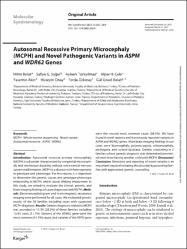| dc.contributor.author | Bolat, Hilmi | |
| dc.contributor.author | Sağer, Safiye Güneş | |
| dc.contributor.author | Türkyılmaz, Ayberk | |
| dc.contributor.author | Çebi, Alper Han | |
| dc.contributor.author | Akın, Yasemin | |
| dc.contributor.author | Onay, Hüseyin | |
| dc.contributor.author | Özkınay, Ferda | |
| dc.contributor.author | Bolat, Gül Ünsel | |
| dc.date.accessioned | 2023-09-25T07:36:42Z | |
| dc.date.available | 2023-09-25T07:36:42Z | |
| dc.date.issued | 2022 | en_US |
| dc.identifier.issn | 1661-8769 / 1661-8777 | |
| dc.identifier.uri | https://doi.org/10.1159/000524391 | |
| dc.identifier.uri | https://hdl.handle.net/20.500.12462/13424 | |
| dc.description | Bolat, Hilmi (Balikesir Author) | en_US |
| dc.description.abstract | Introduction: Autosomal recessive primary microcephaly (MCPH) is a disorder characterized by congenital microcephaly and intellectual disability without extra-central nervous system malformation. MCPH is a disease with heterogeneity in genotype and phenotype. For this reason, it is important to determine the genetic causes and genotype-phenotype relationship in MCPH, which causes lifelong impairment. In this study, we aimed to evaluate the clinical, genetic, and brain imaging findings of cases diagnosed with MCPH. Methods: Electroencephalogram and brain magnetic resonance imaging were performed for all cases. We evaluated genetic results of the 39 families including cases with suspected MCPH diagnosis. Results: Genetic diagnosis related to MCPH was provided in 11/39 (28.2%) of these families including 13/41 cases (31.7%). Variants of the WDR62 gene were the most common (61.5%) cause, and variants of the ASPM gene were the second most common cause (38.5%). We have found 6 novel variants and 4 previously reported variants in ASPM and WDR62 genes. Main brain imaging findings in our cases were lissencephaly, polymicrogyria, schizencephaly, pachygyria, and cortical dysplasia. Genetic counseling in 2 families whose genetic diagnosis was determined prevented them from having another child with MCPH. Discussion/Conclusion: Detection and reporting of novel variants is an important step in eliminating this disorder by providing families with appropriate genetic counseling. | en_US |
| dc.language.iso | eng | en_US |
| dc.publisher | Karger | en_US |
| dc.relation.isversionof | 10.1159/000524391 | en_US |
| dc.rights | info:eu-repo/semantics/openAccess | en_US |
| dc.subject | MCPH | en_US |
| dc.subject | Whole-exome sequencing | en_US |
| dc.subject | Novel variant | en_US |
| dc.subject | Autosomal recessive | en_US |
| dc.subject | ASPM | en_US |
| dc.subject | WDR62 | en_US |
| dc.title | Autosomal recessive primary microcephaly (MCPH) and novel pathogenic variants in ASPM and WDR62 genes | en_US |
| dc.type | article | en_US |
| dc.relation.journal | Molecular Syndromology | en_US |
| dc.contributor.department | Tıp Fakültesi | en_US |
| dc.contributor.authorID | 0000-0001-6574-8149 | en_US |
| dc.contributor.authorID | 0000-0002-4574-421X | en_US |
| dc.identifier.volume | 13 | en_US |
| dc.identifier.issue | 5 | en_US |
| dc.identifier.startpage | 363 | en_US |
| dc.identifier.endpage | 369 | en_US |
| dc.relation.publicationcategory | Makale - Uluslararası Hakemli Dergi - Kurum Öğretim Elemanı | en_US |


















